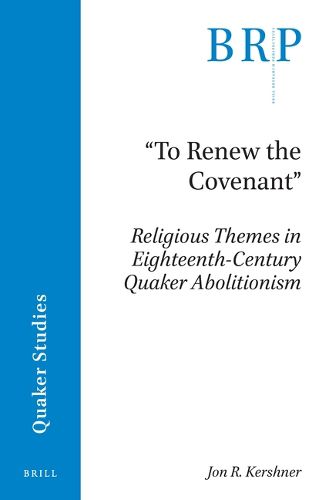Readings Newsletter
Become a Readings Member to make your shopping experience even easier.
Sign in or sign up for free!
You’re not far away from qualifying for FREE standard shipping within Australia
You’ve qualified for FREE standard shipping within Australia
The cart is loading…






In To Renew the Covenant : Religious Themes in Eighteenth-Century Quaker Abolitionism, Jon R. Kershner argues that Quakers adhered to a providential view of history, which motivated their desire to take a corporate position against slavery. Antislavery Quakers believed God’s dealings with them, for good or ill, were contingent on their faithfulness. Their history of deliverance from persecution, the liberty of conscience they experienced in the British colonies, and the ethics of the Golden Rule formed a covenantal relationship with God that challenged notions of human bondage. Kershner traces the history of abolitionist theologies from George Fox and William Edmundson in the late seventeenth century to Paul Cuffe and Benjamin Banneker in the early nineteenth century. It covers the Germantown Protest, Benjamin Lay, John Woolman, Anthony Benezet, William Dillwyn, Warner Mifflin, and others who offered religious arguments against slavery. It also surveys recent developments in Quaker antislavery studies.
$9.00 standard shipping within Australia
FREE standard shipping within Australia for orders over $100.00
Express & International shipping calculated at checkout
In To Renew the Covenant : Religious Themes in Eighteenth-Century Quaker Abolitionism, Jon R. Kershner argues that Quakers adhered to a providential view of history, which motivated their desire to take a corporate position against slavery. Antislavery Quakers believed God’s dealings with them, for good or ill, were contingent on their faithfulness. Their history of deliverance from persecution, the liberty of conscience they experienced in the British colonies, and the ethics of the Golden Rule formed a covenantal relationship with God that challenged notions of human bondage. Kershner traces the history of abolitionist theologies from George Fox and William Edmundson in the late seventeenth century to Paul Cuffe and Benjamin Banneker in the early nineteenth century. It covers the Germantown Protest, Benjamin Lay, John Woolman, Anthony Benezet, William Dillwyn, Warner Mifflin, and others who offered religious arguments against slavery. It also surveys recent developments in Quaker antislavery studies.